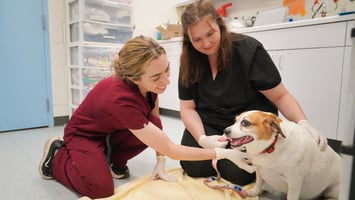Dear friend of the Riney Canine Health Center, My dog Mishka tends to come with me to most places I...
Sound Sensitivities - June 2024
Friends of the Riney Canine Health Center,
Thank you for joining our pack! I’m Aly Cohen, an extension associate for the Cornell Richard P. Riney Canine Health Center, and I’m pleased to share this month’s “From the Vet’s Desk” monthly health tip with our members.
Does anybody else feel like June is one of the busiest months of the year? There seems to be something going on almost every weekend in June, from graduation parties to Father’s Day, birthdays and barbeques with the 4th of July right around the corner. We know we can expect summertime to bring a lot of thunderstorms and, of course, fireworks celebrations, especially on the 4th of July.
While thunderstorms may be a mere inconvenience for anyone with plans to grill outside, for dogs with sound sensitivities, the loud and unexpected noise from thunder or fireworks can cause immense distress. Fireworks can frighten any animal, but the fear can be incredibly stressful, debilitating and dangerous, especially in dogs with known noise aversion or phobias. The hardest part about summer thunderstorms is anticipating them. If your dog has a known sound sensitivity or noise phobia, try to get in the habit of regularly checking the weather. It is much easier to prevent fear and anxiety than to stop them once they have started.
If your dog has a history of sound sensitivities, your role as an owner is crucial. Be sure you have a plan to support them best. This often looks like having anti-anxiety medications as prescribed by your veterinarian, a quiet room with a comfy bed, and long-lasting treats or chews. Laying two types of sounds, for example, white noise and classical music, can help drown out the frightening sounds. Lastly, staying home to support them and provide comfort until the scary sounds end to help support them through a distressing event.
- Stay home to comfort them. Many dogs with noise phobias may also have some separation anxiety, so your absence may make them even more stressed. If this isn’t possible, consider a pet sitter they know and trust.
- Create a safe space. This should be in a location of the home they are familiar with and have a cozy bed or blankets.
- Keep them in a room farthest from the noise and with few or no windows to help decrease outside sound.
- Play white noise and music. Two different types of sound can help drown out the noise. Calming classical music may also help reduce stress.
- Offer long-lasting treats such as stuffed frozen Kongs, Lickimats, or other food toys.
- Plan bathroom breaks and outdoor exercises accordingly to avoid going outside after the fireworks start.
- If your dog is prescribed anti-anxiety medications by your veterinarian, give it early enough before the fireworks start.
If your dog’s fear, anxiety and stress feel unmanageable during fireworks, speak to your veterinarian or consider a referral to a veterinary behaviorist, as more extensive treatment may be needed. Not only can appointment times book out further than expected, but if medications are needed (which often they are), you want to be able to give yourself time to trial the new medications on a day without thunderstorms or fireworks while you can observe your dog to ensure the medication works well for them. Trialing the medication early gives you an opportunity to consult with your veterinarian again if the dose needs to be adjusted or switched to a different medication entirely.
If you have a dog under one year old that has never been exposed to fireworks or thunderstorms, gradually introducing them to these sounds is important. You can find fireworks or thunderstorm sounds streaming online and try introducing them to your dog at very low volumes in short duration. Try this when your dog is very relaxed, and reward them with small, tasty treats while they calmly listen to the sounds. Avoid increasing the volume too quickly and try to have the sessions always end on a good note. Over time, you can gradually increase the volume. The goal should always be to have your dog remain relaxed, calm and interested in the treats during these sessions. On the day of their first exposure to firework sounds, set them up for success as you would a dog with sound sensitivities, as explained in the list above, to help create a more positive experience for them.
When pets get scared, they may try to flee and escape in search of safety if they are not in a safe and secure location. This leads to pets running away from home and putting themselves in danger of injury or getting lost in their most frightened state. Make sure your dog’s ID collar and/or microchip information are up to date and accurate as a precaution. It is best to avoid bringing your dog outside during fireworks, even if they’ve never shown any sound sensitivities. Plan to schedule your time outdoors and walks earlier in the day to avoid needing to go out during the fireworks display.
For more information on this topic, check out our website:
- Fear of fireworks and thunderstorms
- Fireworks fears? Tips to protect your pets
- Fearful dogs
- Anxious behavior: How to help your dog cope with unsettling situations
We hope you find this information helpful for you and your dog. We look forward to catching up with you next month!
Dr. Aly Cohen, D.V.M.
extension veterinarian
Cornell Richard P. Riney Canine Health Center

-1.jpg?width=50&name=Aly%20in%20RCHC%20shirt%20(+%20Mishka)-1.jpg)


